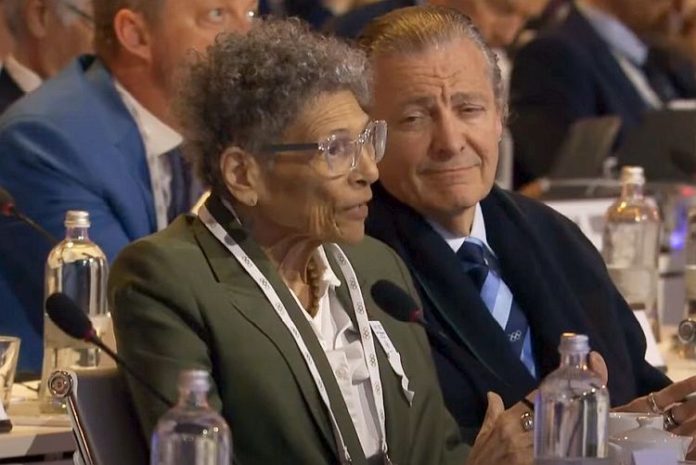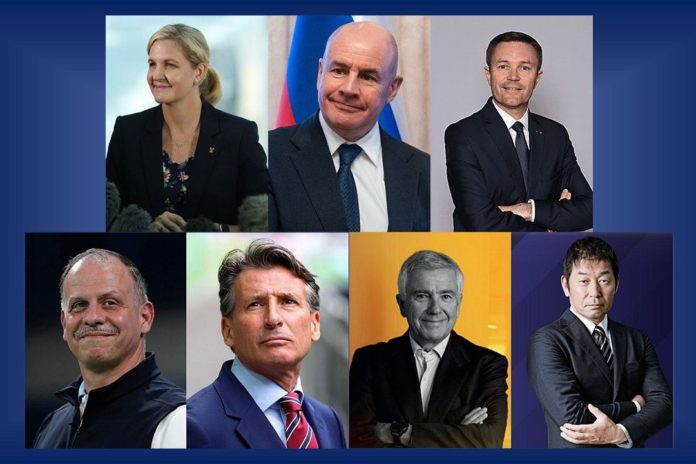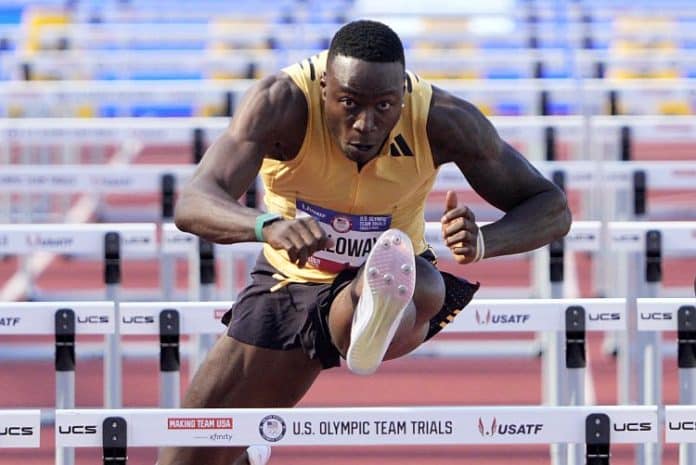★ The Sports Examiner: Chronicling the key competitive, economic and political forces shaping elite sport and the Olympic Movement.★
★ To get the daily Sports Examiner Recap by e-mail: sign up here! ★
≡ TSX EXCLUSIVE ≡
/A very special story by TSX correspondent Karen Rosen with Anita DeFrantz, the senior member of the International Olympic Committee in the United States./
No one would have faulted Anita DeFrantz for skipping the 144th Session of the International Olympic Committee. DeFrantz is weakened by medicine she takes to battle cancer and also suffers from multiple sclerosis.
“I said to my brothers, ‘I’m going. Nothing here on earth or beyond will stop me from being there,'” said DeFrantz, an American athlete, Olympic organizer and activist who has been an IOC member since 1986. “Then I thought, ‘Maybe I shouldn’t have said that part about earth or beyond.”
The 1976 Olympic bronze medalist in rowing, now 72, was determined to show up to support Zimbabwe’s Kirsty Coventry, the second woman to run for IOC president. DeFrantz was the first in 2001.
She has been pushing a walker on wheels around the Costa Navarino resort. “As I’m walking around,” DeFrantz said, “I notice one leg is dragging, but she won! That was the mission.”
And DeFrantz could have been the vote that put Coventry over the top. The twice-Olympic champion swimmer from Zimbabwe needed 49 votes to win on the first ballot and got exactly that number.
“I was expecting a lot of people to vote for her and I hoped it would be the first round, because then it gets icky if it’s not,” DeFrantz said. “People start changing their votes and you can’t keep up with what’s happening.”
She said people have been telling her that her vote was the crucial one. “I say, ‘Thank you for those kind words. And it was the right thing to do.”
When Coventry’s victory was announced, DeFrantz was one of the first to congratulate her, using her walker to cut in front of some colleagues, but she said they were OK with it.
Then DeFrantz told Coventry, “Congratulations. You’re my star.”
Coventry got emotional talking about DeFrantz during her press conference. She called her a “huge inspiration to me and to many women. And I was just really proud that I could make her proud.”
It’s significant that Coventry won in the IOC session named for Olympia, where women were not allowed to compete in the ancient Games. The French founder of the modern Games, Baron Pierre de Coubertin, whose heart is buried in Olympia, didn’t approve of women in the Olympics.
“We need to have all of the world represented within the IOC,” DeFrantz said. “When I was elected, I was one of five women out of 98 IOC members and now we have 43 percent (of the 109 members) are women.
“We have enough to make a difference. Five of us couldn’t make a difference.”
Some of the British press have said IOC President Thomas Bach, who lobbied for Coventry as his successor, told DeFrantz she had to come.
“Absolutely not,” DeFrantz said. “Thomas couldn’t direct me to do anything. I agree with him on a lot of stuff and I follow through and I do my best for the Olympic Movement because I love it.”
She also rejected the idea that Bach directed IOC members to vote for Coventry “because people don’t want to be pushed around,” DeFrantz said. “And if they got pushed around by the president, they probably didn’t vote for her.”
When DeFrantz ran for IOC president in 2001, she lost to Jacques Rogge. “I learned a lot and I appreciated it,” DeFrantz said. “And afterwards people would come up to me and say, ‘You know, I just couldn’t vote for you because President (Juan Antonio Samaranch) was worried about Un Yong Kim getting enough votes and that would have been not good at all.'”
DeFrantz was a longtime chair of the IOC Women’s Commission and was elected to the IOC Executive Board.
Coventry came up through the Athletes’ Commission and also ascended to the EB.
“She managed the Athletes’ Commission during the phase of ‘We want to protest on the podium,’ and that didn’t happen,” DeFrantz said. “And then she’s been chair of the Brisbane coordination commission and helped them understand that there’s things you have to do and can’t do and shouldn’t do because it will blow you out of the water. So, she’s had leadership responsibilities.”
DeFrantz also praised Coventry’s record as sports minister in Zimbabwe, including her handling of a football scandal. “She went from being the most popular minister to being the least popular minister because she stood firm,” DeFrantz said. “And that showed courage and determination and the ability to stand up against people who no longer like you.”
DeFrantz was too sick to go to Lausanne in January – “My brothers wouldn’t let me” – when Coventry and her six rivals made presentations to the IOC membership. But they didn’t even dare to try this time.
“I’m so proud of my colleagues for doing this,” DeFrantz said. “I’m so proud that the Olympic Movement is finally looking like the rest of the world.”
¶
★ Receive our exclusive, weekday TSX Recap by e-mail by clicking here.
★ Sign up a friend to receive the TSX Recap by clicking here.
★ Please consider a donation here to keep this site going.
For our updated, 895-event International Sports Calendar for 2025 and beyond, by date and by sport, click here!























